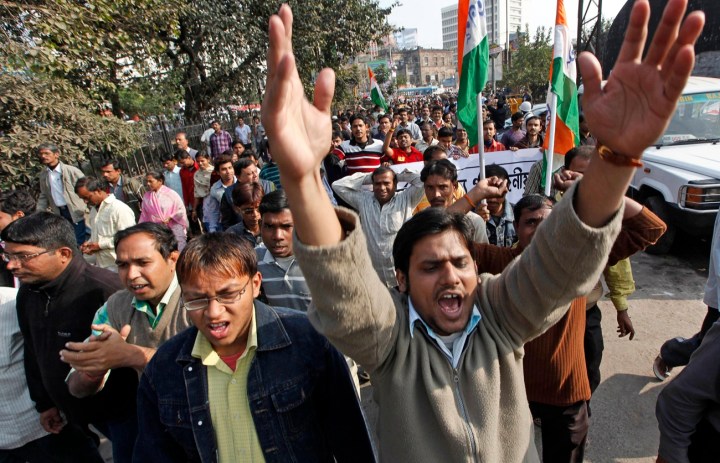Media
Lessons for South Africa from India’s own fight for the right to know

South Africa’s access to information movement remains largely a campaign by media and civic organisations for media and civic organisations. It has yet to mobilise mass support, but India’s right to know movement could offer good insight on how to change that. By MANDY DE WAAL.
India’s Rajasthan is often referred to as “the land of kings”, but for minimum wage workers living in remote rural villages in the state in the early 1990’s, life had become a misery. Government workers were not getting their daily minimum wages because, officials told them, state records showed that the workers hadn’t put in a full day. When asked if they could see government records, the workers were told they were secret.
This denial of access to information eventually seeded a nationwide campaign for the right to information which changed India’s access to information laws, and which contains critical lessons for activists, journalists and civil society in South Africa currently fighting against local secrecy laws.
“What the workers in Rajasthan showed the whole of India is that unless people have the right to access government information, they cannot access other basic rights,” says Anjali Bhardwaj, a director at Satark Nagrik Sangathan (SNS), a New Delhi based citizen’s vigilance organisation that champions open access to information in India. Bhardwaj was in South Africa to share experiences of how India’s access to information movement was initiated in remote villages and city slums with delegates at the Campaign for an African Platform on Access to Information held in Cape Town this past weekend.
“Slowly this demand for a right to information spread to other parts of the country, and people from different walks of life like academia, journalists, and lawyers joined the movement,” says Bhardwaj. Activists started working with the villagers, and by 1996 a national campaign was established by a broad alliance under the name the National Campaign for Peoples’ Right to Information (NCPRI). “A draft access to information bill was proposed by the NCPRI and the campaign demanded that the government pass a right to information law.”
The draft bill gathered momentum, and some nine Indian states passed right to information laws. But the real victory came when a national access to information act was legislated in 2005. A driving force behind the process was activist organisations that engaged India’s marginalised to show them exactly how access to information could change their lives.
“In Delhi, Satark Nagrik Sangathan works in several slum settlements where local government had passed a right to information act, and in this area people came up to us and told us they weren’t getting subsidised food grants,” says Bhardwaj. In India, food subsidies are distributed through “ration shops” governed by storekeepers who manage and distribute these vital supplies. “Our organisation helped people file right-to-information applications so that they could access the records of their local ration shops.”
Stock registers and sale registers of ration stores were obtained and simple equations showed that food subsidy shops were selling rations on the black market. “This was the first time these people in Delhi had proof of corruption and pilferage,” says Bhardwaj.
With information in hand, citizens of Delhi reliant on food subsidies filed mass complaints to India’s government and demanded public hearings that resulted in several ration shops being shut down and disciplinary action being taken against corrupt officials.
“As a result, people in these slums started getting their ration supplies on time and realised that the right to information wasn’t just helping them access information, but was also helping them get the entitlements that were taken away from them due to corruption,” says Bhardwaj. She says making access to information relevant to people is what drove the momentum to put pressure on government to effect a national law protecting people’s right to know.
India’s national access to information law is very wide and has few stringently defined exemptions. The law provides for an independent appeals mechanism as well as for penalties to be imposed on officials who violate the act. It provides for proactive disclosure of information by the government on issues like subsidy programmes, the basis for policy making, as well as the roles and responsibilities that government officials should be held to account for.
“The law has been used extensively by citizens across the country, especially by the marginalised to hold the government accountable. The act has been used by people to access information on social security schemes, health, education, food security and the many other issues that affect their daily life,” Bhardwaj says.
Her group also offers people accessible tools to track local government performance. “SNS pioneered a report card initiative for government officials because people in the Delhi slums told us that once their representatives had been elected, there was no way of knowing what they did, and election promises were never fulfilled.”
The report cards offer a snapshot view of the performance of key government officials, particularly those responsible for spending development funds in local areas. “In one constituency where water shortages were a big problem, people examined the report card and realised their member of the legislative assembly had spent close to 60% of his local area development funds on constructing fountains in parks,” says Bhardwaj.
People had been asking the official for seven years to install water pumps in their slums, but always the local government man said there was no money. Now the people know why money remained an issue.
“People took the report card to him and questioned him on why he spent his local area development funds on constructing fountains, rather than providing drinking water. They told this official that they would not vote for him in the forthcoming elections if he didn’t address their drinking water problems using the funds at his disposal.” The result was that the water pumps arrived rather rapidly and the government man was even on hand to inaugurate them prior to the next elections.
The profound lesson India offers South Africans facing the looming threat of a secrecy bill that fails many freedom tests is one of relevance. “A very important thing is that common citizens feel extremely empowered because for the first time, they know are informed about what the government is doing and can meaningfully participate in governance,” says Bhardwaj.
India’s access to information movement shows people don’t want information for the sake of having information and don’t mobilise for lofty liberal freedom ideals. People fight for information rights when these rights become relevant – when they matter to people’s experience of life, and they begin to realise that the right government information can change lives for the better. DM
Read more:
- A tale of two movements in The Times of India;
- Anna Hazare: anti-corruption activist’s arrest sparks protests across India in The Guardian;
- In India, deadly backlash against freedom of information activists in The Christian Science Monitor;
- India’s National Campaign for Peoples’ Right to Information.
Photograph of Anjali Bhardwaj by iMaverick



















 Become an Insider
Become an Insider